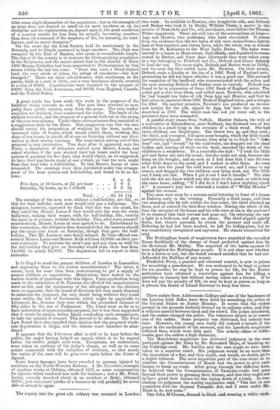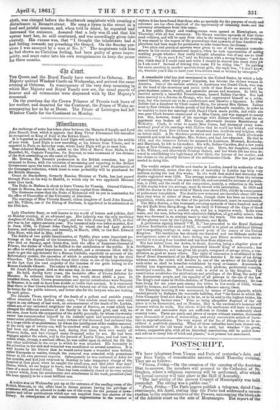Three cadets from Addiscombe. College and one of the bandsmen
of the London Irish Rifles have been fined for assaulti a the police at the Crystal Palace on Easter Monday. It seems that the, cadets present in the grounds foolishly formed up in military order, and that a collision ensued between them and the crowd. The police interfered, and the cadets charged the police. The volunteer struck in to rescue one of the cadets. Some property was destroyed, but nobody was hurt.. However, the young men really did commit a breach of the peace in the excitement of the moment, and the Lambeth magistrate inflicted fines, which were duly paid. The orderly officer at Addis- combe gave the cadets a high character. The Marylebone magistrate has delivered judgment in the ease preferred against Mr.- 1rain by Mr. Beresford Hope, of breaking up the Uxbridge road. Mr. Yardley said the case ought to have been taken to a superior court. His judgment would be no more than the imposition of a fine, and they might, and would, no doubt, go to a higher tribunal. The most important cart of the case arose as to whether the Commissioners of Roads mad the power to give such license to break up roads. After going through the different Acts, he believed that the Commissioners of. Turnpike-roads had gone beyond their power in granting their license, and that they ought not to have given their license for the laying down of a tram. In con- cluding his judgment the worthy magistrate said, "This line is not consistent with the General Turnpike Act, and I must mulct Mr. Train in is. and costs."
One John M'Clenan, dressed in black and, wearing a white neck-
cloth, was charged before the Southwark magistrate with creating a disturbance in Bennett-street. He sang a hymn in the street in a loud and painful manner, and, when told to desist, he repeated and increased the nuisance. Assured that a lady was ill and that his uproar hurt her, he still continued, and was accordingly given into custody. His excuse was, that "I thought the inhabitants had a bad feeling towards my preaching the Gospel. On the Sunday pre- vious I was annoyed by a man at No. 3." The magistrate told him he had shown no Christian feeling, had been guilty of gross impro- priety, and must enter into his own recognizances to keep the peace for three months.































 Previous page
Previous page